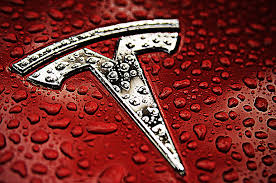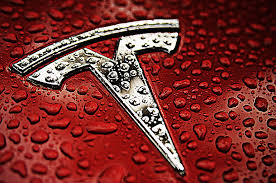
Tesla Inc announced record delivery of its electric cars for its latest completed quarter, which was well above Wall Street expectations as the company successfully fended off global chip shortages while ramping up manufacturing in China.
This also marked the sixth consecutive quarter of record deliveries for the most valuable company in the world.
In the fourth quarter, Tesla, driven by billionaire CEO Elon Musk, delivered 308,600 automobiles, well exceeding analyst expectations of 263,026 units.
Tesla's October-December deliveries were up over 30 per cent year over year and nearly 70 per cent more than the record deliveries made by the company in the previous quarter.
"Great work by Tesla team worldwide!" Musk wrote on Twitter.
Despite increased rivalry and pressure from regulators after complaints from consumers about product safety, Musk's electric car firm increased manufacturing in China.
Models built in China are shipped to Europe and a few Asian countries by Tesla.
In 2021, the company increased its annual deliveries by 87 per cent over the previous year, to 936,172 vehicles.
Tesla will be able to maintain an annual growth rate of more than 50 per cent for "quite a while," Musk stated in October of last year.
"They have beaten all the odds," Gene Munster, managing partner at venture capital firm Loup Ventures, said on Sunday. "The first is the demand for their products is through the roof. And the second is they're doing a great job of meeting that demand," he said.
Despite difficulties in manufacturing at its new plants and supply chain issues, Munster expects Tesla to produce 1.3 million cars in 2022.
In October, Tesla Chief Financial Officer Zachary Kirkhorn said it was difficult to forecast how quickly the firm would be able to ramp up manufacturing at new facilities in Texas and Berlin, which will employ new car technologies and teams.
Tesla said in October that it hoped to start producing cars at both locations by the end of 2021, although it is unclear whether it fulfilled that goal. Tesla did not answer an inquiry regarding the plants from Reuters. It had planned to start manufacturing at its Berlin factory last summer.
In a report released on Friday, Deutsche Bank predicted that Tesla would deliver over 1.5 million vehicles this year, despite chip shortages remaining a concern.
As a result of the pandemic and lockdown precautions, automakers curtailed chip orders in 2020. Tesla, on the other hand, never altered their production projection with suppliers to maintain its ambitious expansion plan, which Musk claims helped the company weather the chip scarcity.
Tesla, unlike most manufacturers, designs some semiconductors in-house, and reconfigured software to use less scarce chips, according to Musk.
Musk, who previously stated that "2021 has been the year of extremely insane supply chain bottlenecks," expressed optimism in October that the concerns would be resolved in 2022.
The good sales came despite Tesla raising vehicle pricing in the United States dramatically this year to address rising supply chain costs.
In October, Tesla's market valuation surpassed $1 trillion after rental car giant Hertz announced it had bought 100,000 of the firm's vehicles. Tesla's stock dropped after Musk announced on Twitter in November that he was considering selling 10% of his investment in the company.
In total, Tesla stock increased by over 50 per cent in 2021.
(Source:www.moneycontrol.com)
This also marked the sixth consecutive quarter of record deliveries for the most valuable company in the world.
In the fourth quarter, Tesla, driven by billionaire CEO Elon Musk, delivered 308,600 automobiles, well exceeding analyst expectations of 263,026 units.
Tesla's October-December deliveries were up over 30 per cent year over year and nearly 70 per cent more than the record deliveries made by the company in the previous quarter.
"Great work by Tesla team worldwide!" Musk wrote on Twitter.
Despite increased rivalry and pressure from regulators after complaints from consumers about product safety, Musk's electric car firm increased manufacturing in China.
Models built in China are shipped to Europe and a few Asian countries by Tesla.
In 2021, the company increased its annual deliveries by 87 per cent over the previous year, to 936,172 vehicles.
Tesla will be able to maintain an annual growth rate of more than 50 per cent for "quite a while," Musk stated in October of last year.
"They have beaten all the odds," Gene Munster, managing partner at venture capital firm Loup Ventures, said on Sunday. "The first is the demand for their products is through the roof. And the second is they're doing a great job of meeting that demand," he said.
Despite difficulties in manufacturing at its new plants and supply chain issues, Munster expects Tesla to produce 1.3 million cars in 2022.
In October, Tesla Chief Financial Officer Zachary Kirkhorn said it was difficult to forecast how quickly the firm would be able to ramp up manufacturing at new facilities in Texas and Berlin, which will employ new car technologies and teams.
Tesla said in October that it hoped to start producing cars at both locations by the end of 2021, although it is unclear whether it fulfilled that goal. Tesla did not answer an inquiry regarding the plants from Reuters. It had planned to start manufacturing at its Berlin factory last summer.
In a report released on Friday, Deutsche Bank predicted that Tesla would deliver over 1.5 million vehicles this year, despite chip shortages remaining a concern.
As a result of the pandemic and lockdown precautions, automakers curtailed chip orders in 2020. Tesla, on the other hand, never altered their production projection with suppliers to maintain its ambitious expansion plan, which Musk claims helped the company weather the chip scarcity.
Tesla, unlike most manufacturers, designs some semiconductors in-house, and reconfigured software to use less scarce chips, according to Musk.
Musk, who previously stated that "2021 has been the year of extremely insane supply chain bottlenecks," expressed optimism in October that the concerns would be resolved in 2022.
The good sales came despite Tesla raising vehicle pricing in the United States dramatically this year to address rising supply chain costs.
In October, Tesla's market valuation surpassed $1 trillion after rental car giant Hertz announced it had bought 100,000 of the firm's vehicles. Tesla's stock dropped after Musk announced on Twitter in November that he was considering selling 10% of his investment in the company.
In total, Tesla stock increased by over 50 per cent in 2021.
(Source:www.moneycontrol.com)














